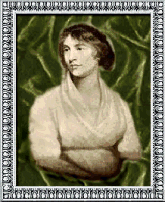

Mary was born on April 27th in London. Her father was John Edward Wollstonecraft and her mother, Elizabeth 2 . She was the oldest girl, and James, Charles, Eliza, and Everina were born after her. She had an older brother, Edward.
Between the years of 1759 and 1768 the Wollstonecrafts moved around frequently. John Edward tries his hand at many different trades but unlike Wollstonecraft's grandfather, he is considered an overall failure at the business of making a livelihood .
Interestingly, many websites on Mary Wollstonecraft leave out the detail that Mary's father was an abusive alcoholic. He has been described as a "drunken, brutish father" 4 . Her mother, "weak but harsh". In this instance we see the clear link between the personal and the political. For Mary, justice could not exist in one realm without having to be attained in the other. Also, it has been said that Mary's mother quite favored her brother over Mary, spoiling him and neglecting her 5 . Yet Mary, not her brothers, was the one who defended her mother against her violent father 6 . At a young age, we see her instinct for defending those who are not strong played out very clearly, even in personal relationships where she was not prized.
Due to her father's "violent temper" the family lost almost all of their money and had to move to Yorkshire. However, Mary met Mr. Clare her (a clergyman who encouraged her education) and Francis (Fanny) Blood in 1775. Fanny was to become Mary's closest friend 7
By the time the family moved to Walworth, where Mary's father decided to essentially live off his property and stop working, her mother became anxious and weak, leaving Mary (also strained) the head of the household. At the age of 16 she had the responsibility of a family on her shoulders-- yet she accepted the burden 8 .
When Mary's own sister was married to an abusive husband and Mary she felt her sister was in danger, Mary rescued her and took care of her. Again, we can clearly see here how Mary "flout(ed) convention privately and in her published writings" 9 .
By taking her sister away from her brother in law, she resigned herself "to the notoriety that her refusal to conform to 18th century values forced upon her". 10
Mary said, "I knew I should be the ...shameful incendiary" she confided to Everina, "in this shocking affair of a woman's leaving her bed-fellow." 11 . "Her reputation never recovered from this particular act long after her death" yet it is obvious she practiced the feminist independence she preached.

